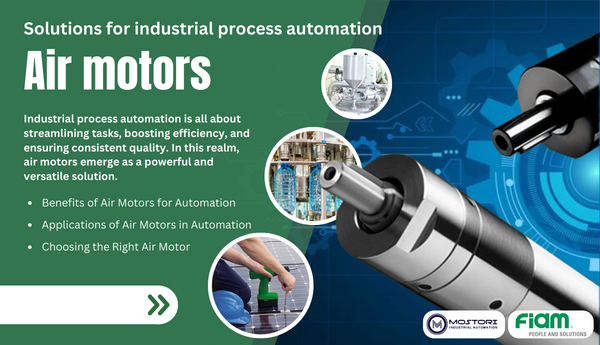Solutions for industrial process automation : Air motors
Posted 15 May 2024 13:18 | 734 views
Industrial process automation is all about streamlining tasks, boosting efficiency, and ensuring consistent quality. In this realm, air motors emerge as a powerful and versatile solution.
Air motors are engines powered by compressed air. Unlike electric motors, they rely on readily available compressed air systems commonly found in industrial settings. This eliminates the need for complex electrical wiring and reduces the risk of electrical hazards.
-
Simplicity and Efficiency : Air motors boast a straightforward design with minimal moving parts. This translates to easy operation, lower maintenance requirements, and high efficiency in converting compressed air into usable power.
-
Safety : Since they don't generate sparks, air motors are ideal for flammable or explosive environments. Additionally, the absence of electrical components minimizes the risk of shock hazards.
-
Versatility : Air motors come in various sizes and configurations, including vane, piston, and diaphragm types, each suited for specific applications. They can provide high torque for demanding tasks or operate at variable speeds for controlled processes.
-
Clean Operation : Air motors don't generate oil or emissions, making them a clean alternative for processes requiring a contamination-free environment, such as food and beverage production or pharmaceutical manufacturing.
-
Cost-Effectiveness : Air motors are generally less expensive to purchase and maintain compared to electric motors. Additionally, their use leverages existing compressed air infrastructure, reducing overall system costs.
Order: Fiam Products
Order: Fiam Automatic solutions
-
Assembly Lines : Air motors power screw guns, nut runners, and robotic arms for precise and efficient assembly tasks.
-
Material Handling : Conveyor systems, sorting machines, and palletizers often utilize air motors for smooth and reliable material movement.
-
Machining and Processing : Drilling, milling, grinding, and mixing operations can leverage air motors for controlled and powerful actuation.
-
Packaging : Air motors play a crucial role in capping bottles, applying labels, and sealing packages within automated lines.
-
Quality Control : Air motors can be integrated into testing and inspection equipment, providing precise actuation for reliable quality checks.
Selecting the appropriate air motor for your automation needs depends on several factors :
-
Power Requirements : The torque and speed needed for the specific task will determine the motor size and type.
-
Duty Cycle : Consider how frequently and for how long the motor will be used to choose between continuous-duty or intermittent-duty motors.
-
Environmental Conditions : For applications with dust, moisture, or extreme temperatures, specialized air motors with appropriate seals and materials might be necessary.
Conclusion :
Air motors offer a compelling solution for various industrial process automation applications. Their simplicity, safety, versatility, and cost-effectiveness make them a valuable asset for businesses seeking to enhance efficiency and optimize production. By carefully considering your specific needs and choosing the right air motor, you can breathe new life into your automation processes.
Souce : https://www.fiamgroup.com/en/products/air-motors/
Key word : #AirMotors #Motors #Air #Automation

